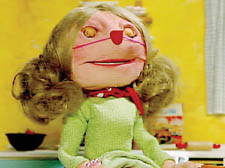|
|
 |

A Still from Susie, the film which won the Jameson Short Film Award and was directed by Cathy Snelling |
A women’s eye view of the world of film
Birds Eye View is a film festival dedicated to promoting female directors. Dan Carrier spoke to founder Rachel Millward
WHEN Hollywood’s finest sit down and think about who they would like to see win best director, there is almost no chance the person whose name is in the golden envelope will be a woman.
In 78 years of Oscars, only three have ever been nominated – and none have won it.
And the gender barrier is still rife – in Western film making, only seven per cent of people in senior directing and production roles are women.
But now, thanks to the efforts of a 29-year-old film buff from Highbury Grove, female film makers are being given a new showcase to display their work.
Rachel Millward is behind the Birds Eye View film festival, a series of shorts running at London cinemas, the Curzon Soho and at top-notch music festivals such as this coming week’s Big Chill event in Worcestershire.
She set up Birds Eye View in 2002 to promote women film makers.
Rachel was originally inspired to work in film after a trip to South Africa. She was working in Cape Town with women’s groups and decided to return to London to make documentaries with the vague working brief of concentrating on political issues that directly affect women.
She quickly discovered how few women were working in senior film production jobs – and this gave her the idea of establishing Birds Eye View, to give other female directors and producers a promotional forum to get their work spotted.
She enlisted the help of famous names in the business – among the patrons are Joanna Lumley and comediennes Rhona Cameron and Jessica Stephenson have been presenting the showings – and began trawling film festivals for female directors looking to showcase their work.
So why is it important to have a festival only for women film makers, and why is it hard for female film makers to get in to the business?
Rachel believes there are a number of factors, stemming from the film industry being traditionally a male dominated profession.
She says: “Historically, directors have always been men. There was also an old boy’s network among film makers, producers and the studios which helps you get the jobs.
“Then there are the crews; in the past the equipment was not easy to use and that again made it a closed shop.”
And in the past, directing was such a time consuming job it also put barriers up to women.
Rachel adds: “Directing is such a massive job that takes a lot of time and dedication – months away from home, long hours, and that can be hard.”
She believes often women are more comfortable in other roles. “Emma Thompson said she didn’t want to direct – that it was not a pleasant job. Instead, she has turned to writing,” Rachel says.
But with the help of the Birds Eye team, Rachel believes more women will become directors.
Hattie Macdonald, a director whose film The Banker won a Bafta last year, has made the breakthrough, as has Bend It Like Beckham film maker Gurinder Chadha and Bridget Jones director Beeban Kidron, who, Rachel says, told the studio that while she was editing the final rushes she was leaving at 4.30pm each day, so she could have a life away from work.
Breaking the mould
AMANCAY Tapia is at the front of a new wave of politicised women film makers.
Her most recent film, America, headlined the prestigious New York Latino international film festival this week after being spotted on TV networks in South America.
And she is helping break the mould of men dominating directing.
Amancay, whose childhood was split between Santiago, Bolivia and Galicia, Spain, makes films that feature the world of London Latinos.
“I wanted to make films about South America but use London as a backdrop,” she says. “I wanted to tell the immigrants’ story, and although there is not as large a Hispanic community in London as there is in New York, there is till a sizeable number living here.”
America was written after a trip to Bolivia. She adds: “I wanted to make a film about this: a young Bolivian girl, trapped in London, whose mother has died in a demonstration. Her sister calls from La Paz, and she promises to get back to her home in time for her mother’s funeral – which is the following day.”
But the plane leaves in 90 minutes, the flight costs £500 – and she only has £100 to her name.
“America spends the day running around London desperately looking for money to buy her ticket to La Paz and be present at her mum's funeral. But the journey to Heathrow will change her life forever.
CLICK BELOW TO SEARCH FOR ACCOMODATION
|
 |
|


